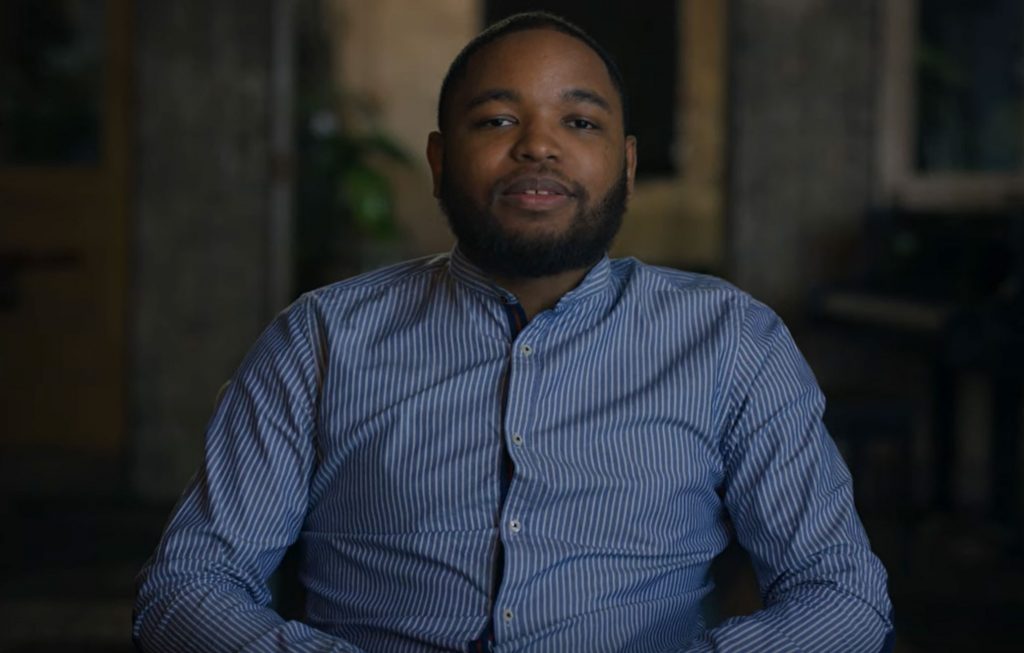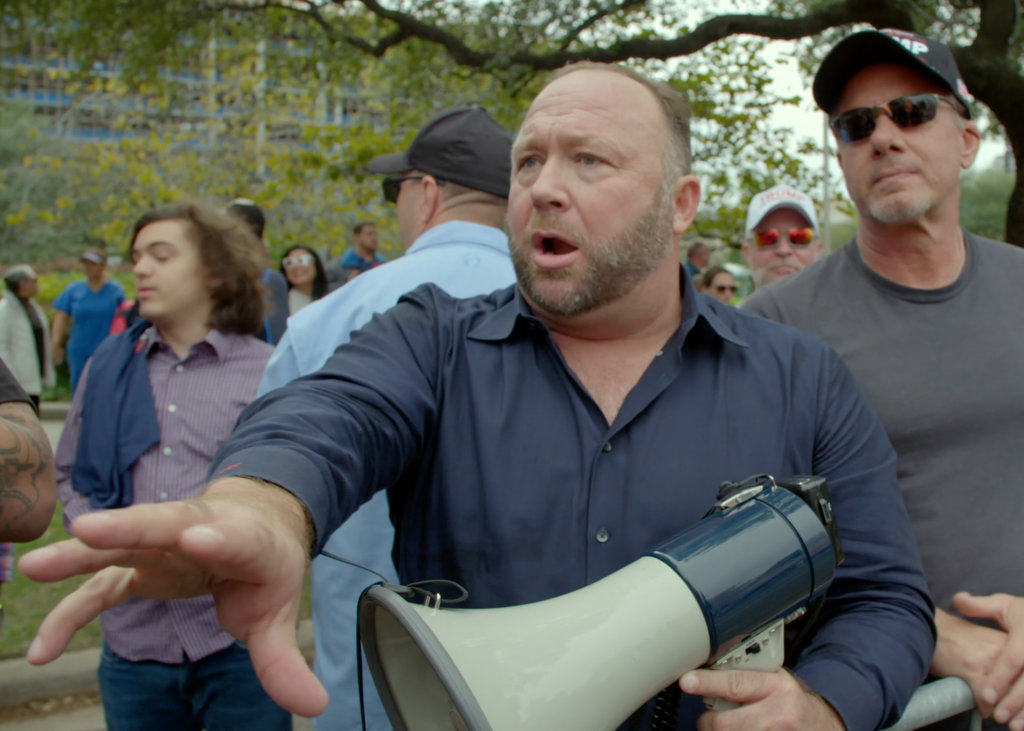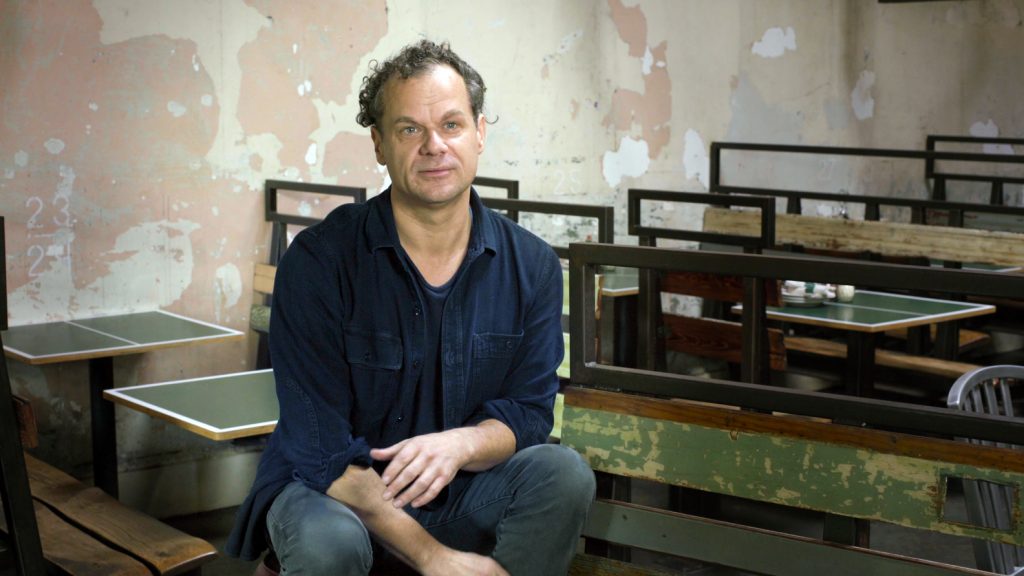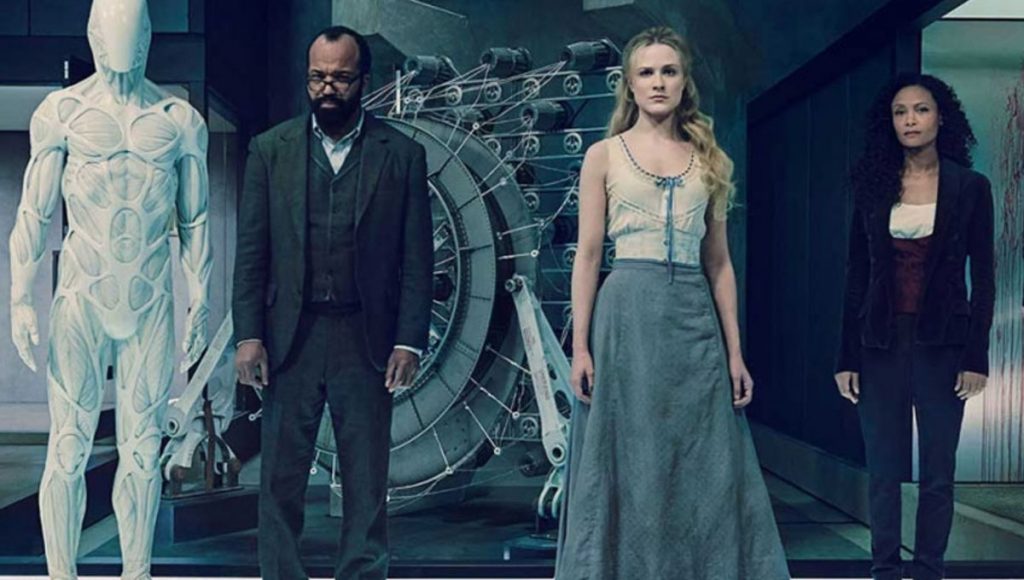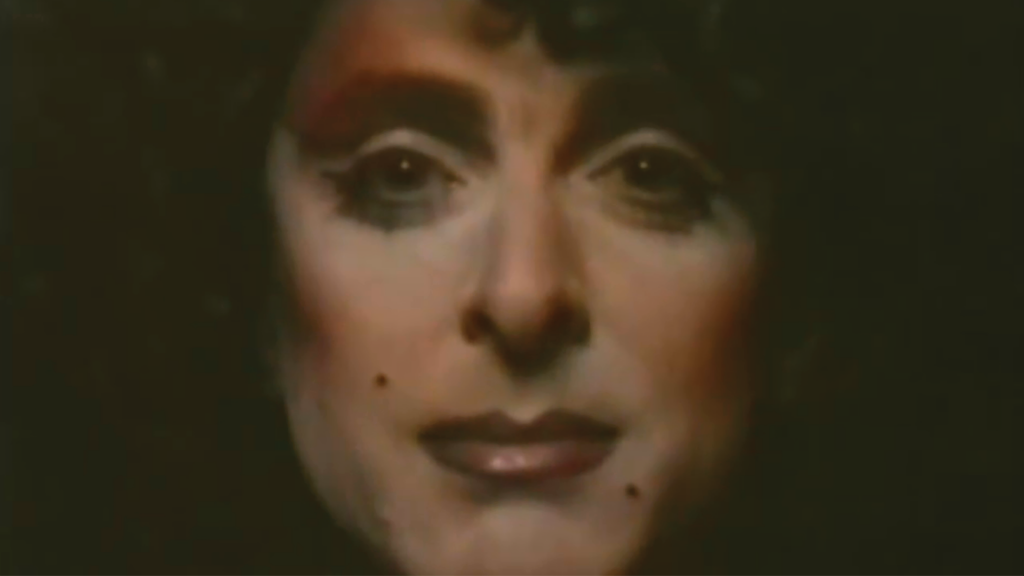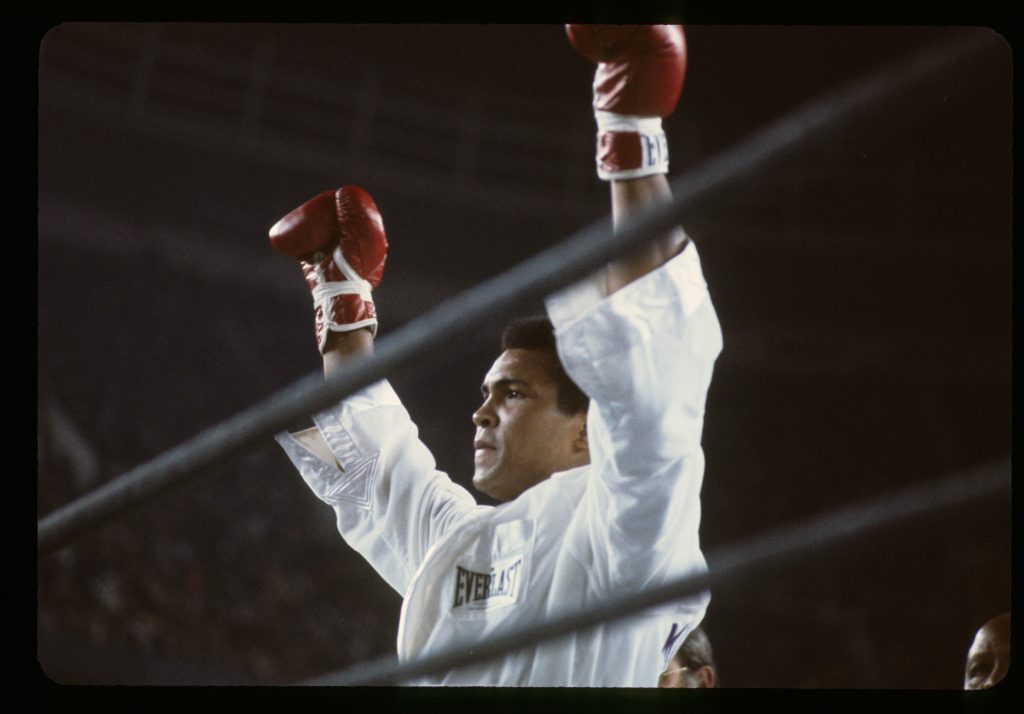October 29, 2019
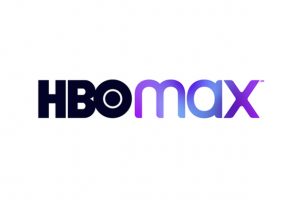
The following is a press release from WarnerMedia:
HBO MAX, WarnerMedia’s new streaming platform launching in May of 2020, will offer an impressive direct-to-consumer experience with 10,000 hours of premium content for everyone, ranging from families with young children to adults of all ages. Anchored with and inspired by the legacy of HBO’s excellence, unparalleled quality and innovative, award-winning storytelling, the new offering will bundle all of HBO together with an extensive collection of new original programming produced exclusively for HBO Max (Max Originals), select favorites from WarnerMedia’s enormous portfolio of beloved brands and libraries, and key third-party acquisitions.
HBO Max Social
Twitter: @HBOMax
YouTube: youtube.com/hbomax
Instagram: #HBOMax
Facebook: #HBOMax
MAX ORIGINALS
*Announced Today, October 29, 2019
KIDS AND FAMILY
Adventure Time: Distant Lands
These four new specials will continue the Adventure Time stories that captured imaginations and introduced unlikely heroes Finn and Jake, best buds who traversed the mystical Land of Ooo and encountered its colorful inhabitants.
BMO follows the lovable little robot from Adventure Time. When there’s a deadly space emergency in the farthest reaches of the galaxy, there’s only one hero to call, and it’s probably not BMO. Except that this time it is!
Obsidian features Marceline & Princess Bubblegum as they journey to the imposing, beautiful Glass Kingdom—and deep into their tumultuous past—to prevent an earthshaking catastrophe.
Wizard City follows Peppermint Butler, starting over at the beginning, as just another inexperienced Wizard School student. When mysterious events at the campus cast suspicion on Pep, and his checkered past, can he master the mystic arts in time to prove his innocence?
Together Again brings Finn and Jake together again, to rediscover their brotherly bond and embark on the most important adventure of their lives.
Genre: Animation
Creator: Pendleton Ward
Executive Producer: Adam Muto
Produced by: Cartoon Network Studios
Craftopia
Craftopia is an epic kids crafting competition show hosted by YouTube influencer Lauren Riihimaki (aka LaurDIY). Contestants, nine to fifteen years old, put their imaginations to the test and make their crafting dreams come true in a magical studio. After racing to fill their carts with inspiring materials, crafters meet larger-than-life challenges, making the most amazing creations the world has ever seen.
Genre: Non-fiction
Host: Lauren Riihimaki
Executive Producers: Lauren Riihimaki, Rhett Bachner, Brien Meagher
Produced by: B17 Entertainment
Esme & Roy
Esme & Roy follows a young girl, Esme, and her best monster friend, Roy, on their adventures as the best monstersitters in Monsterdale. Aimed at children ages four to six, it offers a creative new approach to teaching “learning through play” and mindfulness strategies. The series invites children into a colorful world where even the littlest monsters can overcome big challenges together.
Genre: Animation
Produced by: Sesame Workshop
*The Fungies!
A prehistoric comedy, The Fungies! explores Fungietown through the whimsical quests of Seth, a young student at Fungietown Elementary. Seth loves science and sharing his exciting discoveries with all his Fungie friends. But in his search for the ultimate scientific adventure, Seth often stirs up trouble for Fungietown’s colorful inhabitants leading to hilarious and heartwarming surprises.
Genre: Animation
Creator: Stephen Neary
Executive Producer: Rob Sorcher
Produced by: Cartoon Network Studios
Gremlins: Secrets of the Mogwai
Set in 1920s Shanghai, this animated series is an epic adventure comedy for the whole family that traces the origins of the Mogwai to the lush and perilous Jade Valley, in the Western Chinese countryside.
Genre: Animation
Writer: Tze Chun
Executive Producers: Steven Spielberg, Darryl Frank, Justin Falvey, Sam Register
Co-Executive Producers: Tze Chun, Brendan Hay
Supervising Producer: Dan Krall
Produced by: Amblin Television in association with Warner Bros. Animation
*Jellystone
Welcome to the town of Jellystone – a charming place where your favorite Hanna-Barbera characters live, work and play together…but, at the same time, can’t help but stir up trouble for one another. The animated series includes classic characters such as Yogi, Boo Boo, Snagglepuss, Adam Ant, Huckleberry Hound, Jabberjaw, Magilla Gorilla and more.
Genre: Animation
Executive Producers: Carl Greenblatt, Sam Register
Produced by: Warner Bros. Animation
Karma
Sixteen contestants, ranging in age from 12 to 15, go off the grid to overcome physical challenges, with the laws of karma setting the rules. This adventure competition series, hosted by YouTube sensation Michelle Khare, tests mental and physical stamina as the kids unravel how their social actions impact their success in the game. Focus, giving, humility, growth, connection, change and patience are the path to becoming the “Karma Champion.”
Genre: Non-fiction
Host: Michelle Khare
Showrunner: Fred Pichel
Executive Producers: JD Roth, Adam Greener, Sara Hansemenn
Produced by: GoodStory Entertainment
Little Ellen
This animated children’s show explores the world through the eyes of a hilarious and unpredictable seven-year-old Ellen DeGeneres, on her adventures in her musical hometown of New Orleans. Little Ellen takes big risks and makes big mistakes, but she’s always able to laugh at herself and bounce back when things don’t go as planned.
Genre: Animation
Executive Producers: Ellen DeGeneres, Kevin A. Leman II, Sam Register
Co-Executive Producer: Jennifer Skelly
Producer: Jason Blackman
Produced by: Warner Bros. Animation and Ellen Digital Ventures
*Looney Tunes Cartoons
An all-new Looney Tunes Cartoons series featuring the marquee characters in their classic pairings in simple, gag-driven and visually vibrant stories. HBO Max has ordered 80 eleven-minute episodes, each comprised of animated shorts that include adapted storylines for today’s audience. Fans can also look forward to holiday-themed specials.
Genre: Animation
Voice Cast Members: Eric Bauza, Jeff Bergman, Bob Bergen
Executive Producers: Pete Browngardt, Sam Register
Produced by: Warner Bros. Animation
Mecha Builders
A spin-off of Sesame Street, Mecha Builders features favorite Sesame Street characters as heroes in a robot-animation style.
Genre: Animation
Produced by: Sesame Workshop
The Monster at the End of This Story
Starring lovable, furry Grover from Sesame Street, The Monster at the End of This Story is a new animated version based on the acclaimed children’s picture book, The Monster at the End of This Book.
Genre: Animation Special
Produced by: Sesame Workshop
The Not Too Late Show with Elmo
A family-centric live-action take on a late night talk show, hosted by Elmo and featuring Sesame Street’s many celebrity friends.
Genre: Talk Show
Produced by: Sesame Workshop
Sesame Street
For 50 years, Sesame Street has helped children grow smarter, stronger, and kinder by providing preschoolers with the gold standard in educational programming. Five new 35-episode seasons of this legendary series come to HBO Max.
Genre: Puppets/Live Action
Produced by: Sesame Workshop
*Tig N’ Seek
Tig N’ Seek is about eight-year-old Tiggy and his gadget-building cat, Gweeseek, as they search for the lost items of Wee Gee City. With Tiggy’s cheerful attitude and Gweeseek’s exceptional inventing capabilities, the duo humorously navigate day-to-day dilemmas at the Department of Lost and Found.
Genre: Animation
Creator: Myke Chilian
Executive Producer: Rob Sorcher
Produced by: Cartoon Network Studios
GEN Z
15 Minutes of Shame
Monica Lewinsky and Catfish’s Max Joseph’s documentary takes an in-depth look at the public shaming epidemic in our culture and explores our collective need to destroy one another. The film will feature individuals from around the globe who have been publicly shamed – while exploring the bullies, the bystanders, the media, psychologists, politicians and experts in between.
Genre: Documentary Film
Executive Producers: Monica Lewinsky, Max Joseph, Steve Ascher, Kristy Sabat
Produced by: Six West
Brad & Gary Go To…
The six-episode series will follow Hollywood power couple, Brad Goreski and Gary Janetti, as they go on a jet-setting culinary adventure around the globe, inspired by their Instagram stories that went viral this summer.
Genre: Non-fiction
Cast: Brad Goreski, Gary Janetti
Executive Producers: Brad Goreski, Gary Janetti, Matt Anderson, Nate Green, Cooper Green, Tara Long
Produced by: Purveyors of Pop and Entertainment One (eOne)
*College Girls (wt)
From Mindy Kaling, this comedy follows three 18-year-old freshman roommates at Evermore College in Vermont. A bundle of contradictions and hormones, these sexually active college girls are equal parts lovable and infuriating.
Genre: Comedy
Writer/Showrunner: Mindy Kaling
Executive Producers: Mindy Kaling, Howard Klein
Produced by: Kaling International in association with Warner Bros. Television
*DC Super Hero High
This half-hour comedy executive produced by Elizabeth Banks follows a group of students experiencing the fun and drama of adolescence at a boarding school for gifted kids. These teens are just trying to navigate the pressures of high school, but none of them realize that someday they will become legendary DC super heroes.
Genre: Comedy
Writer: Scott Weinger
Executive Producers: Elizabeth Banks, Max Handelman, Scott Weinger, John D. Beck, Ron Hart
Co-executive Producer: Dannah Shinder
Produced by: Brownstone Productions in association with Warner Horizon Scripted Television
Generation Hustle (wt)
From award-winning filmmaker Alex Gibney, Generation Hustle (wt) is a 10-part HBO Max original from CNN Original Series about the lengths young people will go to for fame, fortune, and power.
Genre: Documentary
Executive Producers: Alex Gibney, Yon Motskin, Stacey Offman, Richard Perello
Produced by: Jigsaw Productions and CNN Original Series
Gossip Girl
Eight years after the original website went dark, a new generation of New York private school teens are introduced to the social surveillance of Gossip Girl. The prestige series will address just how much social media — and the landscape of New York itself — has changed in the intervening years.
Genre: Drama
Executive Producers: Joshua Safran, Stephanie Savage, Josh Schwartz; Leslie Morgenstein and Gina Girolamo of Alloy Entertainment
Co-executive producer: Lis Rowinski of Fake Empire
Produced by: Warner Bros. Studio
Grease: Rydell High
A joyous musical series set in and around the world of Rydell High, the show reimagines the global smash hit movie with characters old and new. It’s still the 1950s, a world that rocks with big musical numbers and new original songs. It’s the peer pressures of high school, the horrors of puberty, and the rollercoaster of life in middle America with a modern sensibility that will bring it to life for today’s musical lovers.
Genre: Musical
Executive Producers: Picturestart and Temple Hill
Produced by: Paramount Television and Picturestart
*Green Lantern
Inspired by DC Comics’ Green Lantern and introducing characters from this iconic comic, this will be one of the biggest shows Berlanti Productions has ever done.
Genre: Action Drama
Executive Producers: Greg Berlanti, Sarah Schecter
Produced by: Berlanti Productions in association with Warner Bros. Television
*Strange Adventures
A superhero anthology executive produced by Greg Berlanti, Strange Adventures will feature characters from across the DC canon. The drama will explore close-ended morality tales about the intersecting lives of mortals and superhumans.
Genre: Drama
Writer/Showrunner: John Stephens
Executive Producers: Greg Berlanti, Sarah Schechter, John Stephens
Produced by: Berlanti Productions in association with Warner Bros. Television
*Tooned Out
Executive produced by Robert Zemeckis, Tooned Out is a half-hour, hybrid live-action and animated comedy in development for HBO Max. Things get a little cartoony for Mac when he starts seeing iconic cartoon characters, but they’re not just there for laughs, they’re helping him get through a very rough patch in his life.
Genre: Comedy
Creator/Writer: Jared Stern
Executive Producers: Robert Zemeckis, Jared Stern, Jack Rapke, Jackie Levine
Produced by: A Stern Talking To Productions and Compari Entertainment in association with Warner Bros. Animation and Warner Bros. Television
UNpregnant
Adapted from the young adult HarperCollins novel of the same name that tells the story of 17-year-old Veronica, who never thought she’d want to fail a test—that is, until she finds herself staring at a piece of plastic with two solid pink lines. With a promising college-bound future now disappearing before her eyes, Veronica considers a decision she never imagined she’d have to make, embarking on a three-day, 900+ mile road trip to New Mexico with her ex-best friend Bailey. The film offers a mix of humor and grounded human emotion as it tackles complicated friendships and the difficult road to adulthood…all while in a stolen car.
Genre: Feature Film
Cast: Haley Lu Richardson, Barbie Ferreira
Director: Rachel Lee Goldenberg
Writers: Jenni Hendriks, Ted Caplan
Executive Producers: Michael McGrath, Lucy Kitada, Jessica Switch
Producers: Greg Berlanti, Sarah Schechter, Erik Feig
Produced by: Picturestart and Berlanti Productions
ADULTS
Americanah
Based on Chimamanda Ngozi Adichie’s best-selling novel of the same name, Americanah is an epic love story of a woman born in Nigeria who leaves for America and her extraordinary experiences with love, heartache, adversity and self-discovery.
Genre: Drama
Cast: Lupita Nyong’o
Executive Producers: Danai Gurira, Lupita Nyong’o for Eba Productions; Jeremy Kleiner and Dede Gardener for Plan B Entertainment; Andrea Calderwood for Potboiler Television; Didi Rea and Danielle Del for D2 Productions; and Nancy Won
Birth, Wedding, Funeral
In each episode, Lisa Ling will immerse viewers in a different country to reveal their cultures through the lens of the three universal rituals—births, weddings, and funerals. In a quest to understand what connects us and celebrate the diversity of deeply-rooted customs around the world, the series is a riveting investigation of the human experience.
Genre: Documentary Series
Host: Lisa Ling
Executive Producers: Lisa Ling, Dan Rather and Philip Kim for News and Guts, and David Shadrack Smith
Produced by: Part2 Pictures
*Bobbie Sue
After being raised among four rowdy brothers in a blue-collar neighborhood, Bobbie Sue, a headstrong young lawyer lands a career-making case with an upper crust law firm, only to realize she’s been hired for optics and not her expertise. But after discovering her powerful client, a lifelong idol of hers, is trying to cover up exploiting workers within her company, Bobbie decides to take both her and the law firm on, caution and etiquette be damned.
Genre: Feature Film
Cast: Gina Rodriguez
Director: Charles Stone III
Executive Producers: Gina Rodriguez, Emily Gipson
Producer: Donald De Line
The Boondocks
Based on the comic strip created by Aaron McGruder, The Boondocks both depicted and presaged the nation’s most roiling cultural issues. HBO Max has two new reimagined seasons and a 50-minute special.
Genre: Animation
Showrunner: Aaron McGruder
Executive Producers: Aaron McGruder, Norm Aladjem for Mainstay Entertainment, Seung Kim, Meghann Collins Robertson.
Produced by: Sony Pictures Animation in partnership with Sony Pictures Television
Bourdain
A documentary film about the uncommon life of the late storyteller, explorer and chef, Anthony Bourdain.
Genre: Documentary Film
Director/Producer: Academy Award-winning director Morgan Neville
Consulting Producers: Zero Point Zero Production
Executive produced by: CNN Films and HBOMax
Produced by: Morgan Neville’s Tremolo Productions
Theatrical Distributor: Focus
Circe
An adaptation of Madeline Miller’s International bestseller of the same name, Circe is a modern take on the world of Greek mythology told from the powerful feminist perspective of the goddess Circe, who transforms from an awkward nymph to a formidable witch, able to challenge gods, titans and monsters alike.
Genre: Drama
Writers/Executive Producers: Rick Jaffa, Amanda Silver
Produced by: Chernin Entertainment in partnership with Endeavor Content
Crime Farm
Crime Farm is a psychosexual love story that follows Selma and Richard Eikelenboom, forensic homicide experts whose marriage thrives on their all-consuming investigations into the depravity of the world’s most notorious criminals. As a seminal case upends the paradigm of their relationship, their unique, unconventional and sometimes dangerous arrangement stretches the boundaries of marriage and science.
Genre: Drama
Executive Producers: Nicole Kidman and Per Saari from Blossom Films; Janine Sherman
Consulting Producers: Selma and Richard Eikelenboom
Produced by: Academy Award winner Nicole Kidman’s Blossom Films and Warner Horizon Scripted Television
Doom Patrol
With all-new original episodes, the critically acclaimed series features a band of superpowered freaks, part support group, part superhero team, who fight for a world that wants nothing to do with them.
Genre: Drama
Cast: Timothy Dalton, Matt Bomer, Brendan Fraser, Diane Guerrero, April Bowlby
Executive Producers: Greg Berlanti, Jeremy Carver
Produced by: Berlanti Productions in association with Warner Bros. Studio
Dune: The Sisterhood
An adaptation of Brian Herbert and Kevin Anderson’s book based in the world created by Frank Herbert’s Dune, Dune: The Sisterhood explores this universe through the eyes of a mysterious order of women, the Bene Gesserit, whose extraordinary mastery of body and mind allow them to expertly weave through the feudal politics and intrigue of The Imperium.
Genre: Drama
Director: Denis Villeneuve
Executive Producers: Denis Villeneuve, Jon Spaihts, and Dana Calvo; and Brian Herbert, Byron Merritt and Kim Herbert for the Frank Herbert estate
Co-Producer: Kevin J Anderson
Ellen’s Home Design Challenge
Design aficionado Ellen DeGeneres is giving forward-thinking designers the chance to push their creativity to the limit. DeGeneres will be on hand to weigh in on each challenge and provide humorous, colorful commentary.
Genre: Non-fiction
Executive Producers: Ellen DeGeneres, Jeff Kleeman, Arthur Smith
Produced by: Warner Bros. Unscripted & Alternative Television and A. Smith & Co. Productions in association with Telepictures and A Very Good Production
Equal
Equal pays tribute to the epic origin stories of the LGBTQ+ movement. A masterful four-part docuseries that captures the gripping and true backstories of the leaders and unsung heroes, pre-Stonewall, who changed the course of American history through their tireless activism. These warriors gave voice, often in a life-or-death battle, to millions of people yearning for equality and the desire to be themselves.
Genre: Limited Documentary Series
Executive Producers: David Collins, Michael Williams, Rob Eric and Joel Chiodi from Scout Productions; Greg Berlanti and Sarah Schechter from Berlanti Productions; Jim Parsons and Todd Spiewak from That’s Wonderful Productions; Jon Jashni from Raintree Ventures; Mike Darnell and Brooke Karzen from Warner Horizon Unscripted Television.
Expecting Amy (wt)
An unfiltered documentary taking viewers behind-the-scenes as Amy Schumer goes through a difficult pregnancy while on tour. From hospitalizations to going out in front of a crowd of thousands, to quiet moments at home with her family, Schumer shares it all.
Genre: Documentary Film
Cast: Amy Schumer
Producer: Amy Schumer
Editor: Alexander Hammer
First Dates Hotel
Based on the hit UK format, this charming dating series set at an affluent boutique hotel will find single people from multiple generations gathering for an intensive and tailor-made romantic experience. After fun, amusing and potentially disastrous dates, if the potential lovers like each other, they can choose to stay on for a second date in the hopes of finding out if they’re ultimately a match.
Genre: Non-fiction
Executive Producers: Ellen DeGeneres, Jeff Kleeman, Pam Healey, Dan Peirson
Produced by: Warner Bros. Unscripted & Alternative Television in association with Shed Media, A Very Good Production and Twenty Twenty Productions Limited
The Flight Attendant
A one-hour thriller series based on the novel by New York Times best-selling author Chris Bohjalia of how an entire life can change in one night. A flight attendant wakes up in the wrong hotel, in the wrong bed, with a dead man – and no idea what happened.
Genre: Thriller
Cast: Kaley Cuoco, Rosie Perez, T.R. Knight, Michiel Huisman, Sonoya Mizuno, Rosie Perez, Colin Woodell, Zosia Mamet
Adapted and written by: Steve Yockey
Director: Susanna Fogel
Executive Producer: Steve Yockey, Meredith Lavender, Marcie Ulin, Susanna Fogel, Greg Berlanti, Kaley Cuoco, Sarah Schechter
Co-Executive Producer: Suzanne McCormack
Produced by: Yes, Norman Productions and Berlanti Productions in association with Warner Horizon Scripted Television
Full Bloom
An eight-episode, hour-long competition series hosted by celebrity florist Simon Lycett and featuring America’s budding florists vying to be crowned America’s best. With incredible artistic creations and floristry face-offs, Full Bloom allows audiences to escape into a surreal world, as contestants design and execute some of the most wondrous, Wonka-esque floral creations ever seen.
Genre: Non-fiction
Host: Simon Lycett
Judges: Legendary floristry artists Elizabeth Cronin and Maurice Harris
Created and produced by: Eureka Productions
Executive Producers: Chris Culvenor, Paul Franklin, Wes Dening
gen:LOCK
The half-hour animated series focuses on a near-future dystopia undergoing a new, technologically driven world war. Fifty years in the future, an oppressive authoritarian force threatens to conquer the world. A daring team is recruited to pilot a new form of devastating mecha, but they must be willing to sacrifice everything to save the world.
Genre: Animation
Cast: Michael B. Jordan, Dakota Fanning, Maisie Williams, Golshifteh Farahani, David Tennant
Executive Producers: Michael B. Jordan and Alana Mayo of Outlier Society; Matt Hullum and Ryan P. Hall of Rooster Teeth
The Greatest Space
A 10-episode epic design competition show features interior designers traveling around the world to transform an eclectic mix of empty rooms into spectacular spaces.
Genre: Non-fiction
Executive Producers: Bertram van Munster, Elise Doganieri, Mark Dziak, David Collins, Michael Williams, Rob Eric
Produced by: New Media Collective (NMC), Scout Productions
Heaven’s Gate
An intimate, four-part series that explores the infamous religious movement and the stranger-than-fiction circumstances that culminated in the biggest mass suicide to ever take place in the U.S.
Genre: Limited Documentary Series
Director: Clay Tweel
Executive Producer: Clay Tweel
Producers: Ross Dinerstein, Chris Bannon, Eric Spiegelman, Peter Clowney, and Erik Diehn for the digital media company Stitcher
Produced by: Campfire and CNN Original Series
The Hos (wt)
Led by patriarch Binh Ho and his wife, Hue Ho, the power couple immigrated from Vietnam to the United States with little money, relying on hard work to establish the ultimate American dream. They have built a multi-million dollar bank, a real estate development company and a new generation of American Hos. The series pulls back the curtain of their lavish Houston lifestyle and showcases the tight family connections that unite them as well as the multi-generational outrageous drama that ensues.
Genre: Non-fiction
Cast: Binh Ho, Hue Ho, Judy Ho, Washington Ho, Lesley Ho, Aunt Tina, Cousin Sammy
Executive Producers: Katy Wallin, Stephanie Bloch Chambers
Co-Executive Producers: Amanda Ly, Rosalina Lydster
Produced by: Wallin Chambers Entertainment in association with Lionsgate Television
Legendary
Competition has never been this ballsy. Legendary will feature voguing “houses,” each comprised of five performers and a leader – the house “parent.” The teams rotate in a round-robin format, and each episode documents a themed ball from start to finish. The winner ultimately achieves “legendary” status in fashion and dance challenges.
Genre: Non-fiction
Executive Producers: David Collins, Michael Williams, Rob Eric, Renata Lombardo, Shant Tutunjian
Produced by: Scout Productions
Let Them All Talk (wt)
The story of a celebrated author who takes a journey with some old friends to have some fun and heal old wounds. Her nephew comes along to wrangle the ladies and finds himself involved with a young literary agent.
Genre: Feature Film
Cast: Meryl Streep, Candice Bergen, Dianne Wiest, Lucas Hedges, Gemma Chan
Writer: Deborah Eisenberg
Director: Steven Soderbergh
Executive Producers: Ken Meyer, Joseph Malloch
Producer: Gregory Jacobs
Love Life
A 10-episode half-hour romantic comedy anthology series about the journey from first love to last love, and how the people we’re with along the way make us into who we are when we finally end up with someone forever. The series will follow a different protagonist’s quest for love each season, with each episode telling the story of one of their relationships.
Genre: Comedy
Cast: Anna Kendrick, Zoe Chao, Peter Vack, Sasha Compere, Scoot McNairy, Hope Davis, James LeGros
Executive Producer: Paul Feig, Anna Kendrick
Made for Love
A 10-episode, half-hour, series adaptation based on the tragicomic novel of the same name. Made for Love is a dark, absurd and cynically poignant story of divorce and revenge. The series shows how far some will go for love – and how much further others will go to destroy it.
Genre: Comedy
Cast: Cristin Milioti, Ray Romano, Noma Dumezweni
Adapted by: Patrick Somerville
Director/Executive Producer: S.J. Clarkson
Persona (wt)
A documentary feature produced by CNN Films that explores the riveting and unexpected origin story of America’s obsession with personality testing. Embedded in everything from dating sites to job applications, Persona reveals the profound ways personality testing has formed and influenced the world around us.
Genre: Documentary Film
Produced by: CNN Films
*Raised by Wolves
An epic serialized sci-fi series executive produced and directed by Ridley Scott. The series centers on two androids tasked with raising human children on a mysterious virgin planet. As the burgeoning colony of humans threatens to be torn apart by religious differences, the androids learn that controlling the beliefs of humans is a treacherous and difficult task.
Genre: Sci-fi
Writer/Showrunner: Aaron Guzikowski
Cast: Travis Fimmel, Amanda Collin, Abubakar Salim, Winta McGrath, Niamh Algar, Matias Varela, Felix Jamieson, Ethan Hazzard, Jordan Loughran, Aasiya Shah, Ivy Wong
Director: Ridley Scott
Executive Producers: Ridley Scott, Aaron Guzikowski, David W. Zucker, Jordan Sheehan, Adam Kolbrenner, Mark Huffam
Produced by: Scott Free Productions
*Rap Sh*t (wt)
From Issa Rae, Rap Sh*t (wt) is a half-hour comedy series that follows three women – a hip-hop duo and their hustler manager – trying to make it in Miami’s music industry.
Genre: Comedy
Produced by: Issa Rae and Montrel McKay for Issa Rae Productions and Jonathan Barry and Dave Becky for 3 Arts Entertainment
The Scoop (wt)
Produced by CNN Films, this documentary feature will follow the exhilarating and exhausting lives of CNN’s fearless female political reporters as they cover the most unpredictable presidential campaign in American history. This behind-the-scenes documentary draws from unprecedented access to the campaign press corps and reveals how these powerhouse political reporters deal with the candidates as well as with the challenges of life on the road.
Genre: Documentary Film
Produced by: CNN Films
Search Party
Two more seasons of the critically-beloved comedy Search Party comes to HBO Max. Season three finds the gang swept up in the trial of the century after Dory and Drew are charged for the semi-accidental murder of a private investigator. As Elliott and Portia grapple with whether or not to testify as witnesses, the friends are pitted against each other and thrust into the national spotlight as notorious public figures. As Dory’s sanity begins to fracture, it becomes increasingly clear that they may not have brunch together for quite some time.
Genre: Comedy
Cast: Alia Shawkat, Meredith Hagner, John Early and John Reynolds
Executive Producers: Sarah-Violet Bliss, Charles Rogers, Michael Showalter, Jax Media’s Lilly Burns, Tony Hernandez
*Stand-up Specials Presented by Conan O’Brien
Five new comedy specials that include two hosted by Conan O’Brien showcasing short sets from multiple up-and-coming comics, as well as curated one-hour-long sets from three additional comedians.
Genre: Comedy
Executive Producers: Conan O’Brien, Jeff Ross, JP Buck, Adam Sachs
Produced by: Team Coco
Starstruck
Starstruck follows 20-something Rose, a millennial in London, juggling two dead-end jobs and navigating the awkward morning-after when she discovers the complications of accidentally sleeping with a movie star.
Genre: Comedy
Cast: Rose Matafeo
Executive Producers: Rose Matafeo, Jon Thoday, Richard Allen-Turner, Rob Aslett
Station Eleven
A limited series based on Emily St. John Mandel’s international bestseller, Station Eleven is a post-apocalyptic saga that follows survivors of a devastating flu as they attempt to rebuild and reimagine the world anew while holding on to the best of what’s been lost.
Genre: Drama
Cast: Himesh Patel, Mackenzie Davis
Adapted by: Patrick Somerville
Director: Hiro Murai
Superintelligence
Superintelligence tells the story of Carol Peters, to whom nothing extraordinary ever happens. But when she starts getting snarky backtalk from her TV, phone and microwave, she thinks she’s being punked. The world’s first superintelligence has selected her for observation, taking over her life…with a more ominous plan to take over everything. Now Carol is humanity’s last chance before this artificial intelligence-with-an-attitude decides to pull the plug.
Genre: Feature Film
Cast: Melissa McCarthy, Bobby Cannavale, Brian Tyree Henry, Jean Smart, James Corden
Director: Ben Falcone
Producers: Melissa McCarthy, Ben Falcone, Rob Cowan
Produced by: New Line Cinema
Tokyo Vice
Based on Jake Adelstein’s non-fiction first-hand account of the Tokyo Metropolitan Police beat starring Ansel Elgort. The drama captures Adelstein’s daily descent into the neon-soaked underbelly of Tokyo, where nothing and no one is truly what or who they seem.
Genre: Drama
Cast: Ansel Elgort, Ken Watanabe
Writer: J.T. Rogers
Pilot Director: Michael Mann
Executive Producers: Michael Mann, J.T. Rogers, John Lesher, Alan Poul, Emily Gerson Saines, Ansel Elgort, Ken Watanabe, Destin Daniel Cretton
Produced by: Endeavor Content
HBO ORIGINALS
Previously announced series coming to HBO:
Avenue 5
Avenue 5 is a space tourism comedy set 40 years in the future when the solar system is everyone’s oyster. Hugh Laurie will star as the Captain, and with him in charge, nothing can go wrong.
Genre: Comedy
Cast: Hugh Laurie, Josh Gad, Zach Woods, Nikki Amuka-Bird, Rebecca Front, Suzy Nakamura, Ethan Phillips, Lenora Crichlow
Creator: Veep creator Armando Iannucci (also directs the pilot)
Executive Producers: Armando Iannucci, Kevin Loader, Simon Blackwell, Tony Roche, Will Smith
Bad Education
Long Island school superintendent Frank Tassone and his assistant superintendent for business, Pam Gluckin, are credited with bringing Roslyn School District unprecedented prestige, pleasing the board and raising property values in the town. Frank, always immaculately groomed and tailored, is a master of positive messaging, whether before an audience of community leaders or in an office with a concerned student or parent. Frank can do no wrong, until the Roslyn High School newspaper decides to dig deep into some expense reports uncovering an embezzlement scheme of epic proportions, revealing secrets about Frank and forcing the community to question their values and ambitions. Inspired by a true story, Bad Education is a potent dark comedy and commentary on the cost of the pursuit of educational excellence.
Genre: Film
Cast: Hugh Jackman, Allison Janney, Ray Romano
Director: Cory Finley
Writer: Mike Makowsky
Executive Producers: Leonid Lebedev, Caroline Jaczko
Producers: Fred Berger, Eddie Vaisman, Julia Lebedev, Brian Kavanaugh-Jones, Oren Moverman, Mike Makowsky
Produced by: Automatik, Sight Unseen
Betty
Inspired by the critically acclaimed film Skate Kitchen, the series, set against the backdrop of New York City, will follow a diverse group of young women navigating their lives through the predominantly male-oriented world of skateboarding.
Genre: Comedy
Cast: Rachelle Vinberg, Nina Moran, Moonbear, Dede Lovelace, Ajani Russell
Executive Producer/Writer/Director: Crystal Moselle
Executive Producer/Writer: Lesley Arfin
Executive Producer: Igor Srubshchik, Jason Weinberg
Co-Executive Producers: Michael Sherman and Matthew Perniciaro of Bow & Arrow Entertainment
Co-Executive Producer: Rodrigo Teixeira of RT Features
Producer: Izabella Tzenkova of Kotva Films
Producer: Lizzie Nastro
Produced by: Arfin Material, Untitled Entertainment
The Gilded Age
The American Gilded Age was a period of immense economic change, of huge fortunes made and lost, and the rise of disparity between old money and new. Against this backdrop of change, the story begins in 1882 – introducing young Marian Brook, the orphaned daughter of a Southern general, who moves into the home of her rigidly conventional aunts in New York City. Accompanied by the mysterious Peggy Scott, an African-American woman masquerading as her maid, Marian gets caught up in the dazzling lives of her stupendously rich neighbors, led by a ruthless railroad tycoon and his ambitious wife struggling for acceptance by the Astor and Vanderbilt set. Will Marian follow the established rules of society, or forge her own path in this exciting new world that is on the brink of transformation into the modern age?
Genre: Drama
Cast: Christine Baranski, Amanda Peet, Cynthia Nixon, Morgan Spector
Creator/Writer/Executive Producer: Julian Fellowes
Director: Michael Engler
Executive Producers: Gareth Neame, Michael Engler, David Crockett
Produced by: An HBO co-production with NBCU
His Dark Materials
Adapting Philip Pullman’s award-winning trilogy of the same name, which is considered a modern masterpiece of imaginative fiction, this series follows Lyra, a seemingly ordinary but brave young woman from another world. Her search for a kidnapped friend uncovers a sinister plot involving stolen children and becomes a quest to understand a mysterious phenomenon called Dust.
Genre: Drama
Cast: Lin-Manuel Miranda, James McAvoy, Ruth Wilson, Dafne Keen, Anne-Marie Duff, Clarke Peters, Ariyon Bakare, Will Keen, Ian Gelder, Georgina Campbell, Lewin Lloyd, Lucian Msamati, James Cosmo, Daniel Frogson, Tyler Howitt, Ruta Gedmintas, Mat Fraser, Geoff Bell, Simon Manyonda
Executive Producers: Dan McCulloch, Jane Tranter, Julie Gardner, Philip Pullman, Jack Thorne, Tom Hooper, Deborah Forte, Toby Emmerich, Carolyn Blackwood, Ben Irving, Piers Wenger
Directors: Tom Hooper, Dawn Shadforth, Otto Bathhurst, Euros Lyn, Jamie Childs
*House Of The Dragon
A Game of Thrones prequel co-created by George R.R. Martin and Ryan Condal, with Miguel Sapochnik and Ryan Condal to partner as showrunners. Based on Martin’s Fire & Blood, the series, which is set 300 years before the events of Game of Thrones, tells the story of House Targaryen.
Genre: Drama
Creators: George R.R. Martin, Ryan Condal
Showrunners: Ryan Condal, Miguel Sapochnik
Director: Miguel Sapochnik (pilot and additional episodes)
Writer: Ryan Condal
Executive Producers: Ryan Condal, George R.R. Martin, Miguel Sapochnik, Vince Gerardis
How To…With John Wilson
How To…With John Wilson is a first person documentary series hosted by an anxious New Yorker who attempts to give everyday advice while dealing with his own personal issues. Acting as both cameraman and narrator, John covertly documents the lives of fellow New Yorkers in a comic odyssey of self-discovery, inevitably making the audience comfortable with the awkward contradictions of modern life.
Genre: Comedy
Cast: John Wilson
Executive Producer/Writer/Director/Narrator: John Wilson
Executive Producers: Nathan Fielder, Clark Reinking
I Know This Much Is True
A family saga that follows the parallel lives of identical twin brothers in an epic story of betrayal, sacrifice and forgiveness set against the backdrop of 20th-century America. The six episode limited drama series is based on Wally Lamb’s New York Times bestseller and award-winning book I Know This Much Is True.
Genre: Limited Series
Cast: Mark Ruffalo, Melissa Leo, Rosie O’Donnell, Archie Panjabi, Imogen Poots, Juliette Lewis, Kathryn Hahn, John Proccacino
Director/Writer/Executive Producer: Derek Cianfrance
Star/Executive Producers: Mark Ruffalo
Executive Producers: Ben Browning & Glen Basner for FilmNation Entertainment
Executive Producers: Wally Lamb, Gregg Fienberg, Anya Epstein, Lynette Howell Taylor
Co-Executive Producers: Jamie Patricof
Industry
Industry is an exhilarating dive into the world of international finance, as seen through the eyes of ambitious 20-somethings struggling to secure their futures. The series follows a group of young graduates competing for a limited set of permanent positions at a top investment bank in London – but the boundaries between colleague, friend, lover, and enemy soon blur as they immerse themselves in a company culture defined as much by sex, drugs, and ego as it is by deals and dividends. As members of the group rise and fall, they must decide whether life is about more than the bottom line.
Genre: Drama
Executive Producer/Writer: Mickey Down
Executive Producer/Writer: Konrad Kay
Executive Producers: Jane Tranter, Lachlan MacKinnon, Ryan Rasmussen
Executive Producer/Pilot Director: Lena Dunham
Produced for HBO and BBC by Bad Wolf
January 22nd
A fearless, frank and provocative drama series exploring the question of sexual consent and where, in the new landscape of dating and relationships, the distinction between liberation and exploitation lies. Set in London, where gratification is only an app away, the story centers on Arabella, a carefree, self-assured Londoner with a group of great friends, a boyfriend in Italy, and a burgeoning writing career. But when she is spiked with a date-rape drug, she must question and rebuild every element of her life.
Genre: Drama
Cast: Michaela Coel, Weruche Opia, Paapa Essiedu, Aml Ameen, Adam James, Sarah Niles, Ann Akin, Harriet Webb, Ellie James, Franc Ashman, Karan Gill, Natalie Walter, Samson Ajewole
Executive Producers: Phil Clarke & Roberto Troni for Various Artists Ltd
Executive Producer / Writer / Director / Cast: Michaela Coel for FALKNA Productions
Producers: Simon Maloney, Simon Meyers
Director: Sam Miller
Produced by: Various Artists Ltd and FALKNA Productions
Lovecraft Country
The one-hour drama series based on the 2016 novel by Matt Ruff, follows Atticus Freeman as he joins his friend Letitia and his Uncle George to embark on a road trip across 1950s Jim Crow America in search of his missing father. What follows is a struggle to survive and overcome both the racist terrors of white America and the terrifying monsters that could be ripped from an H.P. Lovecraft paperback.
Genre: Drama
Cast: Jonathan Majors, Jurnee Smollett-Bell, Michael Kenneth Williams, Courtney B. Vance, Wunmi Mosaku, Aunjanue Ellis, Jamie Harris, Abbey Lee, Jamie Chung, Jordan Patrick Smith
Executive Producers: Jordan Peele, J.J. Abrams, Misha Green, Yann Demange, Daniel Sackheim, Ben Stephenson, Bill Carraro
Showrunner: Misha Green
Produced by: Bad Robot Productions and Monkeypaw Productions in association with Warner Bros. Television
Mare of Easttown
Kate Winslet stars in this limited series as a small-town Pennsylvania detective who investigates a local murder as her life crumbles around her.
Genre: Limited Series
Cast: Kate Winslet, Julianne Nicholson, Jean Smart, Angourie Rice, Evan Peters, Cailee Spaeny, David Denman, John Douglas Thompson, Patrick Murney, Ben Miles, James McArdle, Sosie Bacon, Joe Tippett, Neal Huff
Creator/Writer/Showrunner/Executive Producer: Brad Ingelsby
Director/Executive Producer: Gavin O’Connor
Executive Producers: Gordon Gray through Mayhem Pictures; Paul Lee through wiip; Mark Roybal through wiip; Kate Winslet
Produced by: An HBO co-production with wiip
The Nevers
The Nevers is an epic science fiction drama about a gang of Victorian women, known as “The Touched,” who find themselves with unusual abilities, relentless enemies, and a mission that could change the world.
Genre: Drama
Cast: Laura Donnelly, Nick Frost, Denis O’Hare, Olivia Williams, Ann Skelly, Zackary Momoh, Tom Riley, James Norton, Amy Manson, Eleanor Tomlinson, Ben Chaplin, Pip Torrens
Executive Producer/Showrunner/Writer/Director: Joss Whedon
Executive Producers: Bernie Caulfield, Jane Espenson, Doug Petrie
The New Pope
Created and directed by Paolo Sorrentino, this drama will mark his second limited series set in the world of the modern papacy, following The Young Pope.
Genre: Limited Series
Cast: Jude Law, John Malkovich, Silvio Orlando, Javier Cámara, Cécile de France, Ludivine Sagnier, Maurizio Lombardi, Henry Goodman, Ulrich Thomsen, Mark Ivanir, Massimo Ghini
Creator/Director: Paolo Sorrentino
Producers: Lorenzo Mieli, Mario Gianani for Wildside
Co-Producers: Haut et Court TV and Mediapro
Writers: Paolo Sorrentino with Umberto Contarello and Stefano Bises
Produced by: Sky, HBO, Canal+
The Outsider
Based on Stephen King’s bestselling novel of the same name, this dark mystery follows a seemingly straightforward investigation into the gruesome murder of a young boy. The crime, however, leads a seasoned cop and an unorthodox investigator to question everything they believe to be real, as an insidious supernatural force edges its way into the case.
Genre: Drama
Cast: Ben Mendelsohn, Cynthia Erivo, Bill Camp, Mare Winningham, Paddy Considine, Julianne Nicholson, Yul Vázquez, Jeremy Bobb, Marc Menchaca, Hettienne Park, Michael Esper
Producer: Ben Mendelsohn
Writers: Richard Price, with episodes written by Dennis Lehane and Jessie Nickson-Lopez
Executive Producers: Jason Bateman/Director (first two episodes). Richard Price, Andrew Bernstein (who directs three episodes), Marty Bowen for Temple Hill Entertainment, Jack Bender, Michael Costigan for Aggregate Films, and Dennis Lehane (Episodes 105-110)
Produced by Bateman’s Aggregate Films and Temple Hill Entertainment in association with Civic Center Media.
Perry Mason
Set in 1932 Los Angeles, the series will focus on the origin story of famed defense lawyer Perry Mason, based on characters from Erle Stanley Gardner’s novels. Living check-to-check as a low-rent private investigator, Mason is haunted by his wartime experiences in France and suffering the effects of a broken marriage. L.A. is booming while the rest of the country struggles through the Great Depression — but a kidnapping gone very wrong leads to Mason exposing a fractured city as he uncovers the truth of the crime.
Genre: Drama
Cast: Matthew Rhys, John Lithgow, Tatiana Maslany, Chris Chalk, Juliet Rylance, Shea Whigham, Nate Corddry, Veronica Falcon, Andrew Howard, Jefferson Mays, Robert Patrick, Stephen Root Gayle Rankin, Lili Taylor
Showrunners: Ron Fitzgerald, Rolin Jones
Executive Producers: Amanda Burrell, Robert Downey Jr., Susan Downey, Ron Fitzgerald, Joe Horacek, Rolin Jones, Tim Van Patten (also Director of multiple episodes)
Producer: Matthew Rhys
The Plot Against America
The Plot Against America is set in an alternate American history and centers on a Jewish family in New Jersey who watch the political rise of Charles Lindbergh, an aviator hero and xenophobic populist who becomes president, defeating Franklin D. Roosevelt in 1940, and turns the country toward fascism.
Genre: Limited Series
Cast: Winona Ryder, Zoe Kazan, Morgan Spector, Anthony Boyle, Azhy Robertson, Caleb Malis, John Turturro
Creators: David Simon and Ed Burns both serve as writers and executive producers on the series, as well as Joe Roth, Nina Noble, Megan Ellison, Sue Naegle, Susan Goldberg and Jeff Kirschenbaum
Co-Executive Producers: Dennis Stratton, Philip Roth
Run
Run centers on Ruby, a woman living a humdrum existence who one day gets a text inviting her to fulfill a youthful pact, promising true love and self-reinvention, by stepping out of her life to take a journey with her oldest flame.
Genre: Comedy
Cast: Domhnall Gleeson, Merritt Wever; Guest Starring Phoebe Waller-Bridge, Rich Sommer
Writer: Vicky Jones
Executive Producers: Vicky Jones and Phoebe Waller-Bridge via DryWrite; Emily Leo for Wigwam; and Jenny Robbins. Kate Dennis directed the pilot and executive produces.
Produced by: Entertainment One, DryWrite, Wigwam Films.
The Third Day
The Third Day is a story told over six episodes and in two distinct halves. The first – “Summer,” directed by Marc Munden, sees Sam, a man drawn to a mysterious island off the British coast where he encounters a group of islanders set on preserving their traditions at any cost. The second – “Winter,” directed by Philippa Lowthorpe, follows Helen, a strong-willed outsider who comes to the island seeking answers, but whose arrival precipitates a fractious battle to decide its fate.
Genre: Limited Series
Cast: Jude Law, Naomie Harris, Katherine Waterston, Paddy Considine, Emily Watson
Writer/Executive Producer: Dennis Kelly (wrote four episodes)
Executive Producers: Dede Gardner and Jeremy Kleiner, Plan B Entertainment
Executive Producer: Felix Barrett, Punchdrunk International
Creators: Felix Barrett, Dennis Kelly
Director/Executive Producer: Marc Munden
Director/Executive Producer: Philippa Lowthorpe
Producer: Adrian Sturges
Writers: Kit de Waal and Dean O’Loughlin (wrote two episodes)
Produced by: HBO and Sky Studios in partnership with Plan B Entertainment and Punchdrunk International
The Undoing
A limited series based on the book You Should Have Known by Jean Hanff Korelitz. Grace Sachs is living the only life she ever wanted for herself. She’s a successful therapist, has a devoted husband and young son who attends an elite private school in New York City. Overnight a chasm opens in her life: a violent death, a missing husband, and, in the place of a man Grace thought she knew, only a chain of terrible revelations. Left behind in the wake of a spreading and very public disaster and horrified by the ways in which she has failed to heed her own advice, Grace must dismantle one life and create another for her child and herself.
Genre: Limited Series
Cast: Nicole Kidman, Hugh Grant, Donald Sutherland, Noah Jupe, Edgar Ramirez, Lily Rabe, Ismael Cruz Cordova, Matilda DeAngelis, Noma Dumezweni
Writer/Executive Producer/Showrunner: David E. Kelley through David E. Kelley Productions
Director/Executive Producer: Susanne Bier
Executive Producers: Nicole Kidman and Per Saari for Blossom Films; Bruna Papandrea for Made Up Stories; Stephen Garrett, Celia Costas
We Are Who We Are
A coming-of-age story about two American teenagers who, along with their military and civilian parents, are living on an American military base in Italy. The series centers on friendship, first-love and all the unknowns of being a teenager, which could happen anywhere, but in this case, happens to be in this little slice of America in Italy.
Genre: Limited Series
Cast: Chloë Sevigny, Jack Dylan Grazer, Alice Braga, Jordan Kristine Seamon
Kid Cudi, Faith Alabi, Spence Moore II, Francesca Scorsese, Ben Taylor, Corey Knight , Tom Mercier, Sebastiano Pigazzi
Showrunner/Writer/Director/Executive Producer: Luca Guadagnino
Writers: Luca Guadagnino, Paolo Giordano, Francesca Manieri
Executive Producers: Lorenzo Mieli, Mario Gianani, Luca Guadagnino, Nick Hall, Riccardo Neri
Producers: Lorenzo Mieli and Mario Gianani for Wildside (part of Fremantle)
Produced by: HBO and Sky Studios
International Distributor: Fremantle
HBO LIBRARY HIGHLIGHTS
Series
Barry
Big Little Lies
Chernobyl
Curb Your Enthusiasm
Deadwood
Entourage
Euphoria
Game of Thrones
Insecure
Last Week Tonight With John Oliver
My Brilliant Friend
Oz
Real Time With Bill Maher
The Righteous Gemstones
Sex and the City
Silicon Valley
Six Feet Under
The Sopranos
Succession
True Blood
True Detective
Veep
Watchmen
Westworld
The Wire
Find all HBO Series: https://www.hbo.com/series/all-series
Movies
Available in first year of launch:
A Star Is Born
Aquaman
Bridesmaids
Crazy Rich Asians
Crazy, Stupid, Love
Detective Pikachu
Fantastic Beasts: The Crimes of Grindelwald
Glass
Isn’t It Romantic?
It Chapter 2
Joker
The Lego Movie 2: The Second Part
Little
Love Actually
Madagascar
Notting Hill
Rio
Shazam!
Smallfoot
The Town
Us
War of the Worlds
Find all HBO Movies: https://www.hbo.com/movies
HBO MAX LIBRARY HIGHLIGHTS
In addition to a robust slate of originals, HBO Max will feature a vast selection of titles from Warner Media’s brands including library content from Warner Bros. Film and Television Studios, New Line Cinema, DC, CNN, TNT, TBS, truTV, The CW, Cartoon Network, Adult Swim, Looney Tunes and more, alongside key third party acquisitions.
Here is a selection that will be available in our first year of launch.
Series
Adam Ruins Everything
Adventure Time
The Alienist
American Dynasties: The Kennedys
Anthony Bourdain Parts Unknown
Aqua Teen Hunger Force
At Home with Amy Sedaris
The Bachelor
The Bachelorette
Batwoman
The Big Bang Theory
The Boondocks
The Carbonaro Effect
The Closer
CNN Decade Series (The 2000s, The Nineties, etc.)
Conan Travel Specials
Dexter’s Laboratory
Doctor Who
Doom Patrol
Ellen’s Game of Games
Falling Skies
The Flintstones
The Fresh Prince of Bel-Air
Friends
Full Frontal with Samantha Bee
Gossip Girl
The Honourable Woman
Impractical Jokers
The Jetsons
Little Big Shots
Looney Tunes
Mad TV
Miracle Workers
The OC
The Office (British version)
The Powerpuff Girls
Pretty Little Liars
Pride and Prejudice
Primal
Rick & Morty
Rizzoli & Isles
Robot Chicken
Samurai Jack
Sesame Street
The Smurfs
South Park
Steven Universe
This Is Life with Lisa Ling
Top Gear / BBC
United Shades of America with Kamau Bell
The West Wing
Whose Line Is It Anyway?
Movies
13 Going on 30
2001: A Space Odyssey
Austin Powers
The Bodyguard
Casablanca
Chariots of Fire
Citizen Kane
The Color Purple
The Conjuring
Dangerous Liaisons
The Departed
The Dark Knight
DC Films – All live action movies from the past decade
The Departed
Gremlins
Gremlins 2: The New Batch
Hairspray
Happy Feet
The Hobbit Trilogy
The Iron Giant
Kill Bill Volumes 1 & 2
The Last Samurai
The Lord of the Rings Trilogy
Magic Mike
March of the Penguins
The Matrix Trilogy
Million Dollar Baby
Miss Congeniality
Mona Lisa Smile
Ocean’s Eleven
The Right Stuff
Risky Business
Scooby-Doo
The Shawshank Redemption
The Shining
Space Jam
Spirited Away and the entire Ghibli Film Collection
Watchmen
Wonder Woman
When Harry Met Sally
The Wizard of Oz

